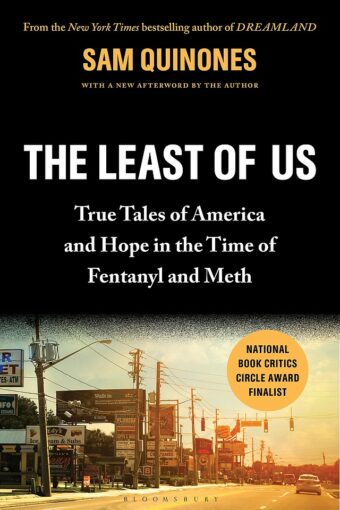The Least of Us: True Tales of America and Hope in the Time of Fentanyl and Meth by Sam Quinones
The Least of Us takes us into the lives of people involved with and impacted by fentanyl and super-meth.
Sam Quinones, a former award-winning investigative reporter and now author, has extensive contacts in Mexico and across the rural United States and is gifted at getting to the heart of their stories in this 2021 book and explaining how their experience shines a light on the epidemic.
The Bellingham Public Library co-hosted “All Hands Whatcom: An Evening with Sam Quinones” with the Chuckanut Health Foundation to hear Quinones discuss how the opioid crisis has expanded and become more devastating with the emergence of synthetic drugs such as fentanyl and methamphetamine. Both have become prevalent in Whatcom County.
Quinones is a former reporter for the Los Angeles Times whose investigative journalism skills shone in his groundbreaking book “Dreamland: The True Tale of America’s Opiate Epidemic,” which won the National Book Critics Circle Award in 2015. In “Dreamland,” he followed the path of black tar heroin from Mexico up the West Coast of the U.S. to the East; and then OxyContin, from Purdue labs on the East Coast and back across the country, overlapping to create a terrible cross-hatch of addiction and death.
In the years since that book came out, Quinones noticed changes in the way the opioid epidemic was playing out. As word slowly spread around the medical community about the dangers of over-prescribing pain medications and governmental regulations limited supply, people addicted to pain pills transitioned to illegal substances like heroin. Then new drugs emerged, like fentanyl. Synthetic drugs could be made on a massive scale, flooding the market, lowering prices and wreaking havoc on entire communities, the book details.
The book takes readers into the lives of people involved with and impacted by fentanyl and super-meth. Quinones has extensive contacts in Mexico and across the rural United States and is gifted at getting to the heart of their stories. (Image courtesy of Bloomsbury Publishing)
According to Quinones, hyper-potent fentanyl “upended the dope world the way tech disrupted business. No farmland needed — no pesticides, no harvesting, no seasons, no irrigation. It shrank the heroin supply chain.”
Quinones interviewed Drug Enforcement Agency agents, addiction treatment providers, recovering addicts, incarcerated dealers, neuroscientists, family members affected by addicts, pharmacologists, local jail administrators and citizens trying to rebuild their drug-torn communities.
While each person’s story is crushing and terrible, not all are bleak. Quinones finds hope in the growing awareness of the way these drugs work and the development of best practices for how to treat addicts and rebuild their lives.
Most inspiring is the coalition of people who recognize that this epidemic affects us all, and to solve it, we all must play a role. All hands are needed in Whatcom County — will you join us?
If you missed his presentation, you can participate in one of two free community discussions: noon to 1:30 p.m. Monday, Aug. 14, or 5:30–7 p.m. Thursday, Aug. 17 at the Bellingham Public Library Lecture Room. (You can register for a free ticket at bellinghampubliclibrary.org.)
Reviewed by Christine Perkins, executive director, Whatcom County Library System.
Originally published in Cascadia Daily News, Aug. 8, 2023

